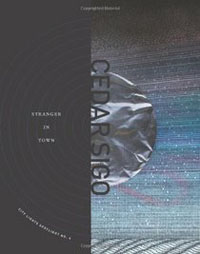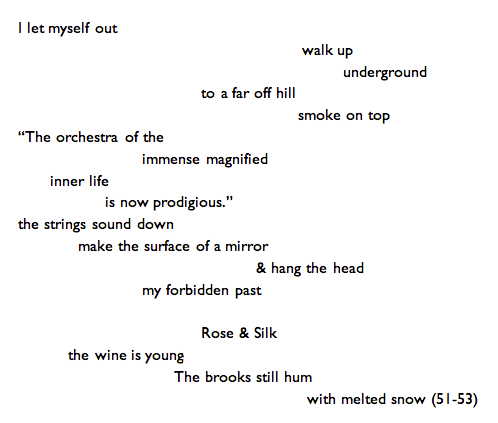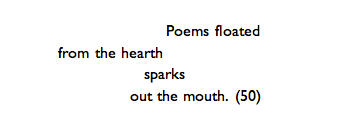 Stranger In Town
Stranger In Town
by Cedar Sigo
City Lights Books, 2010
100 pages / $13.95 Buy from City Lights
“One must keep holy the edges of fragments.” That line appears twice in Cedar Sigo’s second collection of poems, Stranger in Town, and brings to my mind the kabbalistic notion of the shattered vessels. In the beginning, according to Kabbalah, was a divine light so potent that it shattered the vessels in which it was contained, scattering sparks and shards throughout all of creation. Mankind was charged with the task of recovering the fragments and restoring the vessels.
It is possible to read Stranger In Town as such an act of recovery. Take for example the latter half of “$$$Expensive Magic$$$.”
The lines that stand between the quotation marks comprise a fragment of an essay about the effects of mescaline by French surrealist Henri Michaux. The line “my forbidden past” is also the title of a movie, starring Ava Gardner and Robert Mitchum, in which the young female protagonist seeks revenge on the man who left her. And the final lines of the poem, “The brooks still hum/with melted snow,” echo the beginning of Sarah Vaughan’s classic song about love and longing, “If Love Is Good To Me.” These shards, which point to worlds beyond the borders of the poem, exist amidst a fractured personal narrative: the speaker walks outside, presumably (if the context of My Forbidden Past is allowed to bear its weight) after being rejected by a lover, climbs a hill, and smokes at the top. Thus the poem recovers fragments from a varied selection of personal and public sources; however, unlike the anecdote of the shattered vessels, Sigo’s act of recovery is not done in the service of restoration.
“One must keep holy the edges of fragments.” When heard aloud that line might easily be mistaken for One must keep wholly the edges of fragments or One must keep holey the edges of fragments. All three homophonic variations—holy, wholly, and holey—seem relevant to Sigo’s poetics of parataxis and collage. To keep holy the edges of fragments one must believe that there is something sacred in the fragment itself; one must preserve the integrity of each spark and shard as fractured. When read as “wholly” the line seems to argue that one must keep exclusively the edges of fragments; one must keep only the jagged borders which always imply separation and thus point to some other world or context from which the fragment was cleaved. And yet the edges are holey, too; the borders are porous. The fragments that comprise Sigo’s linguistic collages seem at once hermetically fractured and charged with associative meaning. Sigo writes, “There are any number of competent singers among poets; too few know to write the arrangements,” (43) and it is this act of arranging that allows the poems in Stranger In Town to exist as planes of correlation in which the weight of meaning bears down from realms both intrinsic and remote.
Some of Sigo’s lines speak to the way in which the poet’s mouth functions like a vessel for shattering.
In the beginning was a poem—whole as a hearth and unbearably bright—and then the mouth of the poet spoke it to pieces. Though the hearth itself is always just out of reach, beyond the edge of the page, as readers we are asked to gather anyways. We gather around the sparks and are surprised to find enough warmth, enough light.
***
Rachel Levy‘s prose can be found in places like Everyday Genius, PANK, and Drunken Boat. She lives in Boulder, Colorado.
Tags: Cedar Sigo, City Light Books, Rachel Levy, Stranger In Town



It’d be great if a poet pieced together a vessel of unbearable light instead of leaving it shattered.
This book is crazy good. I’ve bought 2 copies already. Thank you Cedar and thank you Rachel.
50.gd/2g
nirl.eu/aR
nirl.eu/aR
nirl.eu/aR
nirl.eu/aR